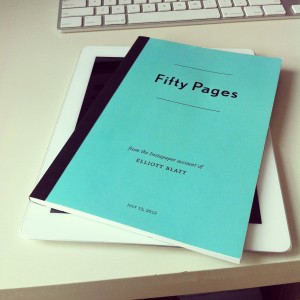 We’ve watched with interest as a few new digital publishing-related startups have launched seemingly out of the blue over the past few weeks.
We’ve watched with interest as a few new digital publishing-related startups have launched seemingly out of the blue over the past few weeks.
Thin Reads, a fantastic new website that runs reviews of e-singles, is definitely one of our favorites, and we’re clearly not alone; the site has been enjoying a ton of mostly glowing press. (Click to see what Mashable, Paid Content, and MediaBistro’s GalleyCat have to say about the new site.)
But there’s another interesting and brand-new startup known as Blackstrap that hasn’t been getting quite as much love lately. In fact, we hadn’t even heard of it until we stumbled onto this Q&A with one of the company’s co-founders on the Huffington Post.
Blackstrap, I can’t help but think, is one of those truly creative entrepreneurial ideas that nevertheless probably doesn’t have much chance of serious success. I just don’t think the potential audience for the service they’re offering is big enough, regardless of the Internet’s globalized long tail theory.
![]() So, what are they offering? A printed, bound book consisting of the Instapaper- or Pocket-saved articles of your choice, for U.S. $15. Seriously: That’s it.
So, what are they offering? A printed, bound book consisting of the Instapaper- or Pocket-saved articles of your choice, for U.S. $15. Seriously: That’s it.
Here’s the description from Blackstrap‘s home page:
Finding great articles online is easy. Sustaining attention long enough to read them isn’t. So we created Blackstrap. You choose the articles you want to read later using Instapaper, Pocket, or favoriting them on Twitter. We print and bind them in a book and mail it to you, for $15.
Sounds kind of stupid, I’ll admit. Maybe even a bit pointless. Why on earth, after all, would someone pay $15 for a collection of articles that could just as easily be printed at the neighborhood Kinko’s, or even on the inkjet printer in a home office?
Well, as someone with a pretty serious (and lifelong) print fetish, I suppose I can see the appeal. For one thing, the printing style and production of Blackstrap books looks a lot like the vintage notebooks produced and sold by Field Notes, which have become hugely successful over the past few years. There’s also the small thrill, I suppose, of curating and “creating” your own book on the Blackstrap site, not to mention the old-school joy of getting a weird little package in the mail a week or two later.
The three co-founders responsible for Blackstrap seem like some pretty smart and accomplished people (Elliott Blatt; Irwin Chen; Tyler Fonda), and I’d be willing to bet they have a few tricks up their proverbial sleeves that’ll be slowly unveiled in time. The site’s ‘About’ page, for instance, says subscription services will be coming soon. And I’m always intrigued when Silicon Valley tech types decide to launch decidedly analog businesses.
I’d say this is probably one worth keeping an eye on.































Thanks for the note. The beauty of Blackstrap is our business model doesn’t demand massive scale. Maybe one of the blessings of being a Brooklyn based team is that we think less about scale and more about humans.
Shoot us a note and we’ll keep you in the loop on our progress. Thanks again for caring about us enough to write. We love it.
Thanks for the note yourself, Tyler!
And yes, I think you’re right: The small-scale aspect of your business is definitely an attractive feature—at least to the sorts of people who’ll be interested in what you’re offering, I would guess. It feels very artisanal (in the Etsy sense of the word), and there’s definitely something attractive about that. In fact, I’ve noticed there’s very much a certain sub-sector of tech-types who are really into artisanal, analog-type “items;” like Field Notes, for instance, and those DIY day planners that are just a stack of 3″ x 5″ cards held together with a binder clip.
Also, I think it helps (or will help, rather, as Blackstrap becomes better known) that this is clearly something all of you are doing on the side. In other words, I can’t imagine this is a model that would support three co-founders (let alone one), but if it doesn’t actually have to support anyone, you’ll have much more freedom to be 100 percent creative. And that’s exactly the sort of creative freedom that often *leads* to ideas that *do* become seriously scalable businesses.
At any rate, yes, I’d love to get updates on your progress. My email is deldridge [AT] napco.com
Many thanks,
Dan Eldridge